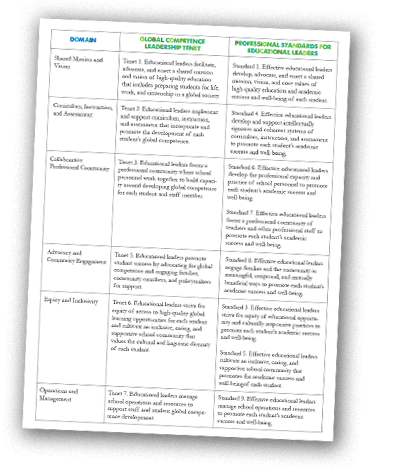Implementing the Global Competence Leadership Tenets
 The Global Competencies for Educational Leaders Framework (download PDF) provides a starting point for educational leaders to embark upon their own professional global learning journey. It is both a catalyst for reflection and a springboard for implementing new global initiatives and improving upon existing ones. The framework also serves institutions and organizations that provide educational leadership training and professional development to structure professional learning experiences that foster these seven global competence leadership tenets.
The Global Competencies for Educational Leaders Framework (download PDF) provides a starting point for educational leaders to embark upon their own professional global learning journey. It is both a catalyst for reflection and a springboard for implementing new global initiatives and improving upon existing ones. The framework also serves institutions and organizations that provide educational leadership training and professional development to structure professional learning experiences that foster these seven global competence leadership tenets.
This framework applies to all educators who lead schools in some capacity. While this most directly pertains to principals and assistant principals, it also applies to those who occupy other formal and informal school leadership positions such as teacher leaders, instructional coaches, school coordinators, and curriculum specialists, along with district leaders who work directly with schools. Policymakers and nongovernmental organizations may also find this framework useful in shaping policies and programs aimed at educating students to thrive in a globalized, diverse society.
The seven tenets of globally competent educational leadership are aspirational, not prescriptive. They are a gold standard for what educational leaders have the potential to achieve, no matter their level of experience or expertise in this area. Furthermore, they are meant to integrate with, not added onto, the professional standards and best practices to which educational leaders already adhere to support students’ academic success and overall well-being. As such, they directly align with the Professional Standards for Educational Leaders, specifically the domains of mission, vision, and core values; equity; curriculum, instruction, and assessment; community of care and support for students; professional capacity of school personnel; professional community for teachers and staff; meaningful engagement of families and community; and operations and management.
We provide concrete examples of what each tenet looks like during implementation through suggested activities checklists, case studies, and additional resources:
- Case Studies. Case studies provide examples of how practicing school administrators are leading global initiatives in their schools. Representing a cross-section of schools in the United States, these leaders show what is feasible in a variety of school contexts (e.g., urban, suburban, elementary schools, middle schools, high schools, low socioeconomic status, high socioeconomic status, homogenous student populations, diverse student populations).
- Suggested Activities Checklist. Whether you have just begun to think about the importance of global education or have been doing this work for decades, the suggested activities checklist provides a personalized starting point on actions to help improve leadership skills for each tenet. The suggested activities are broken into three segments: “First Steps” for those who have not yet taken action in that particular tenet and are looking to get their feet wet, “Deeper Dives” for those ready to plunge a little deeper, and “Full Immersion” for those who feel most advanced in that tenet. Understandably, not all suggested activities are feasible for everyone given context-specific constraints (e.g., state policies that do not allow bilingual instruction, budgetary constraints for professional development). As such, suggested activities should be read as just that—suggestions, rather than a fidelity checklist.
- Resources. These include books, articles, websites, and organizations to help you implement each tenet. Note that some are free, while others have a fee. This is not a comprehensive list but a place to get started, and we encourage you to continue to find additional resources that will help you on your global learning journey.
As you read through each tenet in action, we encourage you to ask yourself: What am I doing already? What next steps can I take to expand my practice? How might these examples pertain to my own school context? Remember, context matters greatly in education, Therefore, there is no single way to enact these tenets. They are designed to spark ideas that make sense for you to implement based on the needs of your students, staff, and community.
The Global Competencies for Educational Leaders Framework provides a common framework for leading schools that support global competence, as well as concrete steps and resources for leading schoolwide efforts that prepare all students for citizenship and work in today’s diverse, interconnected world.
This is a living, breathing project, which we expect will continuously change to adapt to the needs of the students and communities we serve and to address revelations of what happens when we begin to implement these tenets in local contexts. As this framework focuses on leading global learning efforts at the school level, future work can address what globally competent leadership looks like for district administrators and local, state, and federal government officials, along with what leading globally-minded schools looks like across different countries.
We invite you to use the Global Competencies for Educational Leaders Framework to start or enhance your personal professional learning journey and to ignite conversations in your school community about how to effectively and sustainably cultivate globally competent students and staff for students’ individual and collective well-being.
